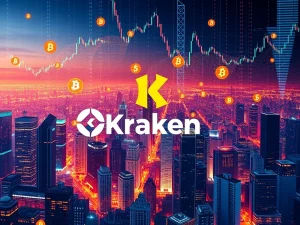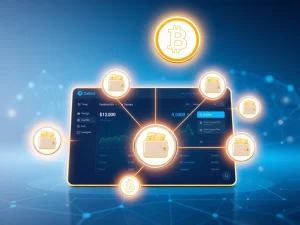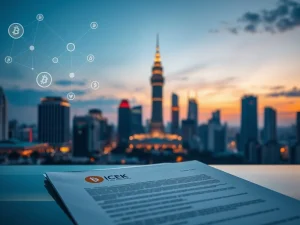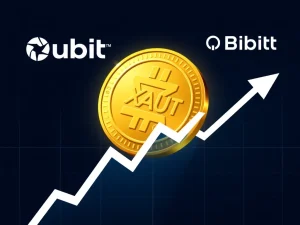Bitcoin Options Skew Signals Dangerous Optimism: What Investors Need to Know

[ad_1]
BitcoinWorld

Bitcoin Options Skew Signals Dangerous Optimism: What Investors Need to Know
Are you feeling the intense optimism bubbling in the crypto markets right now? Bitcoin (BTC) has been showing strength, and it seems traders are betting heavily on continued upside. But a recent analysis points to a potential red flag hidden within the options market. Let’s dive into what the latest Bitcoin options skew is telling us.
Understanding Bitcoin Options Skew
First off, what exactly is Bitcoin options skew? In simple terms, it’s a way to measure the relative cost of buying protection against a price drop (put options) versus betting on a price increase (call options) for Bitcoin. Options give traders the right, but not the obligation, to buy (call) or sell (put) Bitcoin at a specific price (strike price) by a certain date.
The skew is calculated based on the implied volatility of these options. Implied volatility reflects the market’s expectation of how much Bitcoin’s price will move. When the implied volatility for call options is significantly higher than for put options, it means traders are willing to pay a higher premium for the chance of profiting from a price surge compared to protecting against a price fall. This indicates strong bullish sentiment.
Conversely, if put options have higher implied volatility, it suggests traders are more concerned about downside risk and are paying more for protection.
What the Current BTC Options Data Shows
According to a recent Chart of the Day shared by Matrixport crypto on May 27, the Bitcoin options skew has reached an extreme level. Matrixport reported that the skew has fallen to nearly -10%. What does a negative skew mean?
A negative skew indicates that call options are significantly more expensive than put options.
Specifically, implied volatility for calls is now approximately 10% higher than for puts.
This highlights a strong bias among traders towards expecting and positioning for further upward price movement in Bitcoin.
It suggests traders are prioritizing potential gains over hedging against potential losses.
This isn’t just a slight lean towards bullishness; a -10% skew is considered an extreme reading, reflecting a high degree of optimism prevailing in the market.
Is Extreme Crypto Market Sentiment a Warning Sign?
While it feels good to see high optimism, especially after periods of consolidation or downturns, extreme sentiment can sometimes be a contrarian indicator. This is a key point highlighted by the Matrixport crypto analysis.
Why is excessive optimism potentially problematic? When too many market participants are positioned on one side of the trade (in this case, betting heavily on upside via calls), the market can become vulnerable. If something triggers a shift in sentiment or a wave of profit-taking, there might not be enough buyers to absorb the selling pressure, leading to a sharper-than-expected pullback.
Matrixport specifically noted that such extreme bullish sentiment readings from the options skew have historically preceded short-term market pullbacks in Bitcoin.
Historical Context and Bitcoin Price Analysis
Looking back at historical data, there have been instances where a highly negative options skew (indicating extreme bullishness) coincided with or shortly preceded local price tops before a correction occurred. This doesn’t mean a crash is imminent, but it suggests that the market might be getting a little ahead of itself.
Consider this simplified idea:
Sentiment Indicator (Options Skew)
Trader Positioning
Potential Market Reaction
Extremely Bullish (Negative Skew)
Heavy buying of calls, less demand for puts
Increased risk of profit-taking or reversal
Neutral Skew
Balanced interest in calls and puts
More stable market conditions
Extremely Bearish (Positive Skew)
Heavy buying of puts, less demand for calls
Increased potential for a relief rally or bottoming
This historical pattern is why Bitcoin price analysis often includes looking at derivatives data like options skew. It provides insight into the collective positioning and sentiment of sophisticated traders.
Actionable Insights for Your BTC Options Strategy
So, if the Bitcoin options skew is flashing an extreme bullish signal that has historically preceded pullbacks, what should traders and investors consider?
For Call Buyers: Be cautious. While the trend might still be up, the premium for calls is high. Consider if the potential upside justifies the cost, or if scaling back exposure or using tighter stop losses is warranted.
For Put Buyers: Puts are relatively cheaper right now (in terms of implied volatility). If you are concerned about a potential short-term dip, buying puts could be a relatively cost-effective way to hedge your spot holdings or short-term long positions.
For Option Sellers: Selling calls when premiums are high might seem attractive, but be aware of the risk if the bullish trend continues strongly. Selling puts could be an option if you expect the market to hold up or rebound, but this also carries significant risk if a sharp downturn occurs.
Overall Strategy: This signal doesn’t necessarily mean you should abandon your long-term Bitcoin strategy. However, for short-term trading or managing risk, paying attention to this extreme skew and considering hedging strategies or reducing leverage might be prudent.
It’s crucial to remember that options skew is just one indicator among many. A comprehensive Bitcoin price analysis should also include technical indicators, on-chain data, macroeconomic factors, and news events.
Beyond the Skew: Other Factors Influencing Crypto Market Sentiment
While the Bitcoin options skew provides valuable insight into trader positioning, the overall crypto market sentiment is influenced by numerous factors:
Macroeconomics: Interest rates, inflation data, and global economic stability play a significant role.
Regulatory News: Developments regarding crypto regulation in major economies can heavily impact sentiment.
Institutional Adoption: News about large institutions investing in Bitcoin or offering crypto services often boosts optimism.
Technological Developments: Upgrades or issues with the Bitcoin network or other major blockchains can affect confidence.
Geopolitical Events: Global events can drive risk-on or risk-off sentiment across all markets, including crypto.
Therefore, while the options skew is a powerful tool for understanding derivatives market positioning, it should be viewed as part of a larger mosaic when assessing the overall market outlook.
Challenges and Nuances
Interpreting the Bitcoin options skew isn’t always straightforward. Extreme readings don’t guarantee an immediate reversal. Sometimes, extreme sentiment can persist for a while before a correction occurs. Also, the skew can be influenced by factors other than pure directional bets, such as large players hedging existing positions.
The analysis from Matrixport crypto provides a valuable data point, but it’s essential for traders to do their own research and consider their individual risk tolerance and investment goals.
Conclusion: Caution Amidst the Optimism
The current state of the Bitcoin options skew, as highlighted by Matrixport, points to a level of bullishness that is historically associated with increased risk of a short-term pullback. While the overall trend for Bitcoin may remain positive, the derivatives market is signaling that caution might be warranted at these elevated levels of optimism.
Paying attention to indicators like the Bitcoin options skew is crucial for understanding the underlying dynamics of the market beyond just price action. It helps reveal how traders are positioned and the collective sentiment regarding future price movements. As always, a balanced approach that considers multiple data points and risk management is key in navigating the volatile world of cryptocurrency.
To learn more about the latest crypto market trends, explore our article on key developments shaping Bitcoin price action.
This post Bitcoin Options Skew Signals Dangerous Optimism: What Investors Need to Know first appeared on BitcoinWorld and is written by Editorial Team
[ad_2]
Source link









